

Asperger Syndrome - Marriage to a Spouse with Asperger Syndrome. Answer: From Dr, Bob Naseef: If there is one word that describes the reaction of a family member to the diagnosis of autism in someone you love, that word is loneliness.
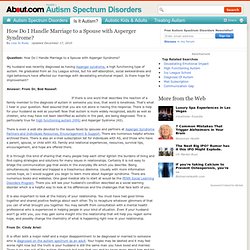
That's what I hear in your question. Rest assured that you are not alone in having this response. There is help for your husband as well as yourself. Now that autism is more widely recognized, adults as well as children, who may have not been identified as autistic in the past, are being diagnosed. Coping With a Partner's Asperger's Syndrome - Autism Center. Asperger Relationships.
There is hope for Asperger relationships.
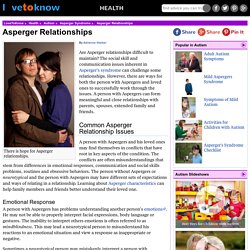
Source Are Asperger relationships difficult to maintain? The social skill and communication issues inherent in Asperger's syndrome can challenge some relationships. However, there are ways for both the person with Aspergers and loved ones to successfully work through the issues. Tips for Being in a Relationship With a Man Who Has ... - Mental Health Article by Rheyanne Weaver. Being involved in a successful romantic relationship can be difficult for most people.
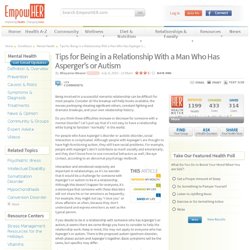
Consider all the breakup self-help books available, the movies portraying cheating significant others, constant fighting and dramatic breakups, and your own relationship history. Asperger Syndrome. Asperger and Marriage. Asperger & Marriage Therapy Recommendations for Marriages Impacted by Asperger Syndrome Any relationship – whether romantic, a friendship, relationship with parents and siblings, etc., is subject to ups and downs due to human nature in general and the individual partners, in particular.
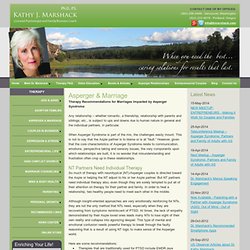
When Asperger Syndrome is part of the mix, the challenges easily mount. This is not to say that the Aspie partner is to blame or is at “fault.” However, given that the core characteristics of Asperger Syndrome relate to communication, emotions, perspective taking and sensory issues, the very components upon which relationships are built, it is no wonder that misunderstanding and frustration often crop up in these relationships. NT Partners Need Individual Therapy So much of therapy with neurotypical (NT)-Asperger couples is directed toward the Aspie or helping the NT adjust to his or her Aspie partner. Here are some recommendations: Dr. 40 Healthy Relationship Signs. Asperger Emotions and Adult Relationships. It has been often said, or implied, that people with Asperger's don't feel emotion.
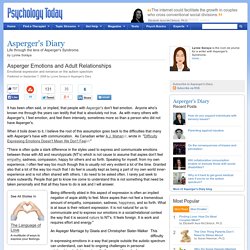
Anyone who's known me through the years can testify that that is absolutely not true. As with many others with Asperger's, I feel emotion, and feel them intensely, sometimes more so than a person who did not have Asperger's. When it boils down to it, I believe the root of this assumption goes back to the difficulties that many with Asperger's have with communication. As Canadian writer A.J. Mahari, wrote in "Difficulty Expressing Emotions Doesn't Mean We Don't Feel:"
Navigating Love and Autism. Asperger Spouses. Asperger spouses are not very common but many long for a loving relationship such as marriage. Some of them are successful at creating a solid family life. It is not easy and research has shown the divorce rate of marriages with an Asperger husband or wife is higher than average. For both parties involved it takes a enormous amount of hard work to let the relationship be successful. The most important thing is to be aware of the Asperger Syndrome in your spouse. Could the Way We Mate and Marry Boost Rates of Autism?
In this week’s paper issue of TIME, author Judith Warner explores a provocative theory about why rates of autism, particularly the mild form known as Asperger’s, are on the rise: because people who have certain “autistic” traits are increasingly meeting and marrying each other and having offspring who are more likely to be on the spectrum.
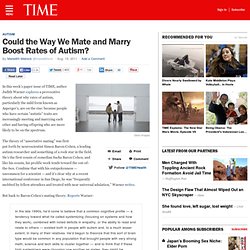
The theory of “assortative mating” was first put forth by neuroscientist Simon Baron-Cohen, a leading autism researcher and something of a rock star in the field. He’s the first cousin of comedian Sacha Baron Cohen, and like his cousin, his prolific work tends toward the out-of-the-box. Combine that with his outspokenness — uncommon for a scientist — and it’s clear why at a recent international conference in San Diego, he was “frequently mobbed by fellow attendees and treated with near universal adulation,” Warner writes.
But back to Baron-Cohen’s mating theory. Reports Warner: Flying By the Seat of My Pants » Blog Archive » Married…with Asperger’s. Posted by Kathy Torrence on Dec 17, 2008 in Books I'm Reading, Family Stuff | So I haven’t posted all week then I post four (or is it five?)
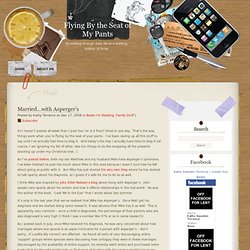
Times in one day. That’s the way things work when you’re flying by the seat of your pants. I’ve been saving up all this stuff to say until I’ve actually had time to blog it. And today’s the day I actually have time to blog it (of course, I am ignoring my list of other, less fun things to do like wrapping all the presents stacking up under my Christmas tree…). Full-spectrum marriage: married to an Aspie. Kristi Sakai Having a successful marriage requires effort, but when one partner has Asperger Syndrome it poses additional challenges.
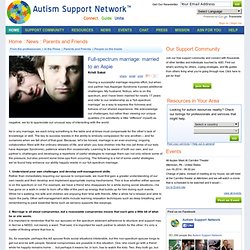
My husband, Nobuo, who is on the spectrum, and I have been married for nearly 17 years and refer to our relationship as a “full-spectrum marriage” as a way to express the richness and fullness of our shared experience. We acknowledge our challenges, but rather than viewing our unique qualities (I’m admittedly a little “different” myself) as negative, we try to appreciate our unusual way of interacting with the world. As in any marriage, we each bring something to the table and at times must compensate for the other’s lack of knowledge or skill. The key to success resides in the ability to embody compassion for one another— and for ourselves when we fall short of that goal. 1. 2. So, for example, perhaps the AS spouse finds social situations intolerable, but the non-spectrum spouse longs to get out and be with people. 3. 4.
Courtesy of APPC.